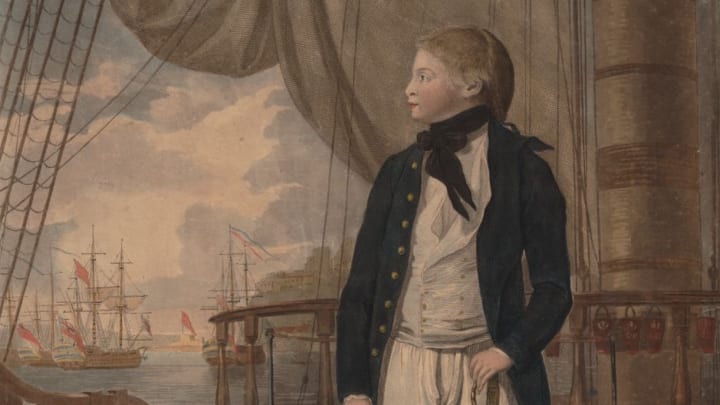During the American Revolution, George Washington, the Commander-in-Chief of the Continental Army, approved a plan to kidnap a British Royal Navy Admiral and a 17-year-old midshipman. The plot was not unusual: Throughout the war, Continental and British army leadership attempted—and sometimes succeeded—in kidnapping colonial governors and high-ranking military officers to gain leverage in stalled negotiations. The British unsuccessfully tried to abduct Washington himself in 1780. But this particular kidnapping would be a royally bold move.
A Noble Endeavor
The teenaged midshipman was Prince William Henry, a son of King George III. The prince, with two older brothers ahead of him in line for the throne—including the future King George IV—had little prospect of wearing the crown, so he joined the Royal Navy.
William Henry arrived in New York City’s harbor on September 26, 1781, aboard the HMS Prince George; he was the first member of the British royal family to set foot in the American colonies. Continental Army spies soon discovered that only a light security detail accompanied the prince when he came ashore.
Colonel Matthias Ogden of the 1st New Jersey Continentals wrote to Washington, proposing the abduction of William Henry and his commanding officer, Admiral Robert Digby. Washington liked the idea and gave his approval in a March 28, 1782, letter to Ogden, stating:
“The spirit of enterprise so conspicuous in your plan for surprising in their quarters, & bringing off the Prince - William Henry & Admiral Digby, merits applause; and you have my authority to make the attempt; in any manner, & at such a time as your own judgment shall direct[.]
“I am fully persuaded, that it is unnecessary to caution you against offering insult or indignity to the persons of the Prince, or Admiral should you be so fortunate as to capture them; but it may not be amiss to press the propriety of a proper line of conduct upon the party you command.”
The Royal Pawn
By the time Ogden received Washington’s letter approving the royal kidnapping, British General Charles Cornwallis had surrendered to Washington on October 19, 1781, following the siege of Yorktown in Virginia. That didn’t spell the end of the plot, though: The Yorktown surrender led to the end of the war and the beginning of peace negotiations; Washington planned to use the royal hostage to force the British to free American prisoners of war as soon as possible.
But the kidnapping plan was scrapped after the British caught wind of the plot and immediately increased William Henry’s security. There’s no way to know whether capturing the prince would have expedited the POWs’ release as Washington hoped—or if it would have instead ignited further conflict with the British.
William Henry returned to England and continued his career in the Royal Navy. Nearly 50 years later, in 1830, the prince unexpectedly ascended the British throne as William IV after his two older brothers died without heirs. After he became king, William IV saw Washington’s letter and quipped, “I am obliged to General Washington for his humanity, but I’m damn’d glad I didn’t give him an opportunity of exercising it towards me.”
Read More About the American Revolutionary War:
